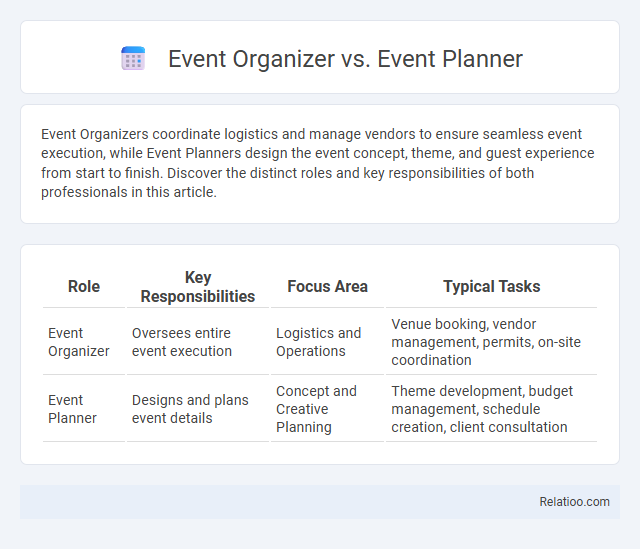Event Organizers coordinate logistics and manage vendors to ensure seamless event execution, while Event Planners design the event concept, theme, and guest experience from start to finish. Discover the distinct roles and key responsibilities of both professionals in this article.
Table of Comparison
| Role | Key Responsibilities | Focus Area | Typical Tasks |
|---|---|---|---|
| Event Organizer | Oversees entire event execution | Logistics and Operations | Venue booking, vendor management, permits, on-site coordination |
| Event Planner | Designs and plans event details | Concept and Creative Planning | Theme development, budget management, schedule creation, client consultation |
Understanding the Roles: Event Organizer vs Event Planner
Event organizers coordinate all aspects of an event, focusing on logistics, vendor management, and on-site execution to ensure smooth operations. Event planners emphasize the creative and strategic elements, such as theme development, budget planning, and client vision alignment. Understanding these distinct roles helps businesses select the right professional for comprehensive event success.
Key Responsibilities of Event Organizers
Event organizers are primarily responsible for executing the logistical aspects of an event, including securing venues, managing vendors, and coordinating on-site activities to ensure everything runs smoothly. They handle crucial tasks such as budget management, scheduling, and compliance with permits and regulations, ensuring every detail aligns with the planned goals. Your role as an event organizer focuses on transforming the event vision into reality by managing operations, overseeing staff, and troubleshooting unexpected issues during the event.
Core Duties of Event Planners
Event planners focus on the comprehensive coordination of events, managing every detail from budgeting and vendor selection to timeline creation and onsite supervision. Their core duties emphasize strategic planning, client consultation, and ensuring seamless execution to meet specific event goals. Unlike event organizers who solely handle logistics, planners blend creativity with project management to deliver tailored and successful experiences.
Skillsets Required for Each Profession
Event organizers excel in logistics coordination, vendor management, and budget control, ensuring seamless execution from start to finish. Event planners require creative vision, client communication, and timeline management skills to design personalized and impactful experiences. You benefit from understanding that event coordinators prioritize operational details, planners focus on concept development, and organizers bridge both by overseeing comprehensive event execution.
Similarities Between Event Organizers and Event Planners
Event organizers and event planners both manage critical aspects of event execution, including coordinating logistics, securing venues, and managing budgets. They work closely with vendors and clients to ensure that event goals and timelines are met efficiently. Both roles require strong communication, organization, and problem-solving skills to deliver successful and seamless events.
Major Differences in Scope and Tasks
Event organizers manage the overall coordination and execution of an event, handling logistics such as venue booking, vendor contracts, and on-site management. Event planners focus more on the creative aspects, including design, theme development, and guest experience enhancements. Your choice depends on whether you need comprehensive event oversight or specialized planning services.
Choosing the Right Professional: Which Do You Need?
Choosing the right professional hinges on the scope and complexity of your event. An event organizer manages logistics, vendors, and schedules to ensure seamless execution, while an event planner focuses on creative vision, theme development, and detailed coordination. For smaller gatherings, an organizer may suffice; larger events benefit from a planner's strategic expertise combined with organizational skills.
Industry Insights: Career Paths and Opportunities
Event organizers coordinate logistics and vendor management, ensuring seamless execution of events, while event planners specialize in conceptualizing event themes, budgets, and client relationships. Careers in event organizing often lead to roles in project management, vendor negotiations, and operations, whereas event planners frequently advance into marketing, public relations, or corporate event management. Industry growth projects a rise in demand for hybrid professionals skilled in both planning and organizing, with opportunities expanding into virtual event coordination and experiential marketing sectors.
Event Success Stories: Organizer vs Planner Contributions
Event success stories often highlight the distinct contributions of event organizers and planners, where organizers handle logistics, vendor coordination, and venue management, while planners focus on conceptualizing themes, creating timelines, and managing budgets. Organizers ensure seamless execution through on-site supervision and problem-solving, directly impacting attendee satisfaction and event flow. Planners' strategic vision and detailed planning establish a strong foundation for event objectives, making their collaboration essential for memorable and successful events.
How to Collaborate Effectively with Both Roles
Effective collaboration with an event organizer and event planner requires clear communication of your goals and expectations from the start. Your role is to provide detailed information on event objectives, budget, and preferred style, allowing organizers to coordinate logistics while planners focus on design and execution. Maintaining regular updates and feedback loops ensures both professionals work synergistically to create a seamless and successful event experience.

Infographic: Event Organizer vs Event Planner
 relatioo.com
relatioo.com